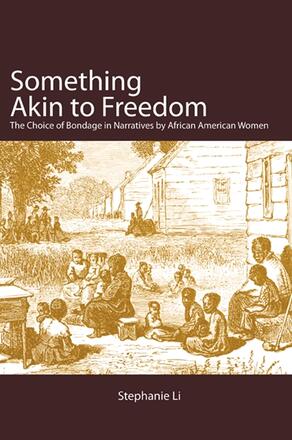
Something Akin to Freedom
The Choice of Bondage in Narratives by African American Women
Alternative formats available from:
Examines why African American women would choose conditions of bondage over individual freedom.
Description
2010 CHOICE Outstanding Academic Title
Why would someone choose bondage over individual freedom? What type of freedom can be found in choosing conditions of enslavement? In Something Akin to Freedom, winner of the 2008 SUNY Press Dissertation/First Book Prize in African American Studies, Stephanie Li explores literary texts where African American women decide to remain in or enter into conditions of bondage, sacrificing individual autonomy to achieve other goals. In fresh readings of stories by Harriet Jacobs, Hannah Crafts, Gayl Jones, Louisa Picquet, and Toni Morrison, Li argues that amid shifting positions of power and through acts of creative agency, the women in these narratives make seemingly anti-intuitive choices that are simultaneously limiting and liberating. She explores how the appeal of the freedom of the North is constrained by the potential for isolation and destabilization for women rooted in strong social networks in the South. By introducing reproduction, mother-child relationships, and community into discourses concerning resistance, Li expands our understanding of individual liberation to include the courage to express personal desire and the freedom to love.
Stephanie Li is Assistant Professor of English at the University of Rochester.
Reviews
"Something Akin to Freedom is a poignant, consistently engaging, and groundbreaking contribution to African American literary criticism, African American and cultural studies, Women's Studies, and other fields; and Li makes excellent use of her primary source material … [it] will hold an important place in African American literary criticism, and help to propel the scholarship along newer trajectories." — Journal of African American History
"Something Akin to Freedom troubles one's notion of freedom … Li has gone a long way toward deconstructing our inherited conceptions of freedom, and has added to our understanding of the challenges of black women's literature." — African American Review
"[Li's] analysis is engaging; the book is well written and cogently argued. Without a doubt, the volume is a significant and timely contribution to African American literary history. It adds to a growing body of scholarship on the rich history of black women's literary texts … Li's scholarship is insightful, bold, and groundbreaking; her study is an exemplary scholarly model." — Legacy
"In this lucid, eloquent book, Li asks the reader to think hard about the nuanced meanings of 'freedom' … Through careful readings of key texts, the author shows that African American women have defined freedom in an alternate, more contextual way, so that liberty comes to mean more than just leaving the South … This study stands as [an] important contribution to both African American studies and American literary studies in general." — CHOICE
"An important contribution to African American literary studies." — Beverly Guy-Sheftall, Spelman College
"This bold and brash project does the kind of interdisciplinary and revisionist work that must be at the center of the future of African American studies." — Mark Anthony Neal, Duke University
"A thoughtful and intriguing study that is bound to be provocative, and even disturbing, to some readers. The author calls into question many of the assumptions that scholars have brought to the study of slavery." — Mae Henderson, University of North Carolina at Chapel Hill